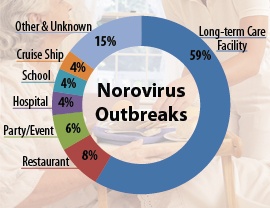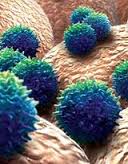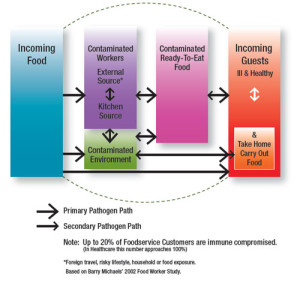Norovirus is a very contagious virus that can infect anyone. You can get it from an infected person, contaminated food or water, or by touching contaminated surfaces. The virus causes your stomach or intestines or both to get inflamed. This leads you to have stomach pain, nausea, and diarrhea and to throw up. These symptoms can be serious for some people, especially young children and older adults.
Anyone can be infected with norovirus and get sick. Also, you can have norovirus illness many times in your life. Norovirus illness can be serious, especially for young children and older adults.
Norovirus is the most common cause of acute gastroenteritis in the United States. Each year, it causes 19-21 million illnesses and contributes to 56,000-71,000 hospitalizations and 570-800 deaths. Norovirus is also the most common cause of foodborne-disease outbreaks in the United States.
The best way to help prevent norovirus is to practice proper hand washing and general cleanliness.
Norovirus can be found in your stool (feces) even before you start feeling sick. The virus can stay in your stool for 2 weeks or more after you feel better.
You are most contagious
- when you are sick with norovirus illness, and
- during the first few days after you recover from norovirus illness.
You can become infected with norovirus by accidentally getting stool or vomit from infected people in your mouth. This usually happens by
Norovirus and food
Norovirus is the leading cause of illness and outbreaks from contaminated food in the United States. Most of these outbreaks occur in the food service settings like restaurants. Infected food workers are frequently the source of the outbreaks, often by touching ready-to-eat foods, such as raw fruits and vegetables, with their bare hands before serving them. However, any food served raw or handled after being cooked can get contaminated with norovirus.
Norovirus outbreaks can also occur from foods, such as oysters, fruits, and vegetables, that are contaminated at their source.
- eating food or drinking liquids that are contaminated with norovirus,
- touching surfaces or objects contaminated with norovirus then putting your fingers in your mouth, or
- having contact with someone who is infected with norovirus (for example, caring for or sharing food or eating utensils with someone with norovirus illness).
Norovirus can spread quickly in closed places like daycare centers, nursing homes, schools, and cruise ships. Most norovirus outbreaks happen from November to April in the United States.
SIGNS/SYMPTOMS OF NOROVIRUS: Diarrhea/Vomiting/Nauses/Dehydration/Stomach Pain/Fever/Headache/Bodyaches.
If you have norovirus illness, you can feel extremely ill and throw up or have diarrhea many times a day. This can lead to dehydration, especially in young children, older adults, and people with other illnesses.
A person usually develops symptoms 12 to 48 hours after being exposed to norovirus. Most people with norovirus illness get better within 1 to 3 days.
You are most contagious when you have symptoms with the norovirus, during the first few days after you have recovered from norovirus.
You can become infected with norovirus by accidentally getting stool or vomit from infected people in your mouth. This usually happens by
- eating food or drinking liquids that are contaminated with norovirus,
- touching surfaces or objects contaminated with norovirus then putting your fingers in your mouth, or
- having contact with someone who is infected with norovirus (for example, caring for or sharing food or eating utensils with someone with norovirus illness or kissing someone with the virus).
What areas are with higher probability in having the disease? PUBLIC PLACES in particularly the following:
Norovirus can spread quickly in closed places like daycare centers, nursing homes, schools, and cruise ships. Most norovirus outbreaks happen from November to April in the United States. I personally was on a cruise that ended up having this and was from the previous trip the ship took but didn’t find out about it till I saw a note with my husband on our pillows in our ship room at that point we were given the opportunity to cancel and reschedule our trip. Cruise line tactic to now have you cancel the trip and not return your bags till the end of the ship cruise along with all that going through security like us we stayed on and took the chance. I ended up not with it or my husband and the cruise went to simple infection control techniques to strict when it affected the people which offended many but not us. Being an RN several years I understood they were doing better infection control tactics but should have started from day one and explained to all. That could be hard on a cruise of people not just from USA.
Protect Yourself and Others from Norovirus
- Practice proper hand hygiene
Wash your hands carefully with soap and water, especially after using the toilet and changing diapers and always before eating or preparing food. If soap and water aren’t available, use an alcohol-based hand sanitizer. These alcohol-based products can help reduce the number of germs on your hands, but they are not a substitute for washing with soap and water. - Take care in the kitchen
Carefully rinse fruits and vegetables, and cook oysters and other shellfish thoroughly before eating. - Do not prepare food while infected
People with norovirus illness should not prepare food for others while they have symptoms and for at least 2 days after they recover from their illness. Also see For Food Workers: Norovirus and Working with Food. - Clean and disinfect contaminated surfaces
After throwing up or having diarrhea, immediately clean and disinfect contaminated surfaces using a bleach-based household cleaner as directed on the product label. If no such cleaning product is available, you can use a solution made with 5 tablespoons to 1.5 cups of household bleach per 1 gallon of water. - Wash laundry thoroughly
Immediately remove and wash clothing or linens that may be contaminated with vomit or stool. Handle soiled items carefully—try not to shake them —to avoid spreading virus. If available, wear rubber or disposable gloves while handling soiled clothing or linens and wash your hands after handling. Wash soiled items with detergent at the maximum available cycle length and then machine dry.
Regarding the treatment, unfortunately there is no specific medicine to treat people with norovirus illness. Norovirus infection cannot be treated with antibiotics because it is a viral (not a bacterial) infection. If you have norovirus illness, you should drink plenty of liquids to replace fluid lost from throwing up and diarrhea. Give children an oral rehydration solution (like pedialyte) to replace lost fluids and electrolytes. Avoid sugary drinks, which can make diarrhea worse, as well as alcohol and caffeinated beverages, which can dehydrate you further.
Good hygiene is the key to preventing an infection with norovirus, especially when you are in close surroundings with a lot of other people.


